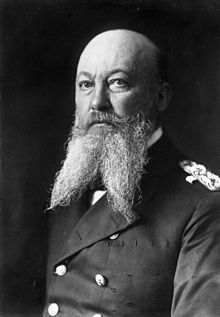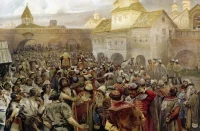In every way possible, the allies even avoided coordinating joint actions by all members of the Entente. Towards the end of the first year of the war, the exhausted Germans were no longer able to advance and the Western front had stabilised, having reached neutral Switzerland on the one side and the sea on the other. The enemy had gone below ground and were constantly improving their defences. The war was dragging on and there was no sign of it coming to an end. It is strange that having already been at war for six months, the Entente allies had still not learnt to coordinate their actions. They seemed to be having some trouble putting pressure on the Reich from both sides at the same time. The British were afraid of such an attack on Germany, since the Germans would not be able to withstand it, and the English did not want Germany to be defeated quickly, as that would mean Russia would be counted as one of the victors.

The bony hand of destruction was slowly but surely starting to creep towards Europe and close on its tail, the future revolution was beginning to cast its shadow across the maps of Russia, Germany and Austria-Hungary. This is an extremely important moment. The Germans correctly understood what was happening very quickly: “The English were hoping to crush our country with the help of the Russian steamroller, and the Franco-Belgian-British army had to slow down our attack; should there have been any danger of Russia being too victorious, their plan was to end the war“, Admiral von Tirpitz quite rightly pointed out.
The plan of the “allies” was working perfectly – Russia and Germany were weakening each other. The German offensive began in January 1915 and continued almost relentlessly until more or less the end of the summer. As a result, Russian troops were forced to give up Galicia, which had been seized earlier, and they sustained significant losses. This was not a catastrophe, however. The front held firm and the abandonment of Poland, following the defeat in Galicia, was a planned operation to straighten out the front line. The German army had also exhausted itself – the Russian front having devoured all of its prepared reserves.
While the Russians were shedding blood, the Anglo-French command was doing nothing to ease the fate of the Russian army. Instead, they were quietly occupied with military construction. During 1915, France increased its production of rifles by one and a half times, cartridges by fifty times and heavy artillery by almost six times. For its part, England increased its production of machineguns by five times and aircraft by almost ten times. Maybe those in the Foggy Albion and sunny Paris did not know about the terrible situation the Russian army were in? They knew perfectly well. French ambassador Maurice Paléologue recalled the words of General Alekseev, Chief of the Russian General Staff, in his memoirs: “Our loss of life was colossal. If we had only needed to replenish available personnel, we would have replaced them quickly since we had more than 900,000 people in reserve. However, we did not have enough guns to arm and train these people…”.
Which is not to say that the allies were not supplying Russia with weapons. That is not how it was, but they were few and far between. So in 1915, for example, the “allies” supplied Russia with just 1.2 million shells, less than one sixth of Germany’s monthly shell production. General Svechin wrote: “Our request to the French to order shells from their factories was refused. It turned out they were not ready to make the same sacrifice as we did at the start of the war, when we were ready to attack in support of our allies. Only in 1916 did the French government grant us permission to buy a small percentage of the output of a factory in Creusot. The factory’s management had no scruples about charging us exorbitantly high prices.”
It was not for nothing that the English let SMS Goeben reach Istanbul and provoked Turkey into entering the war. Russia’s Black Sea ports were blocked, so a significant amount of the “allies'” weapons was delivered via Murmansk and Arkhangelsk, but due to difficulties with transportation, much of the equipment was delayed there and never reached the front. The English only provided transport ships to carry weapons on the condition that in return they were given bread, butter, timber, spirits and important strategic raw materials that Russia herself needed. Before long, the British government demanded that Russia move its gold reserves to London as a guarantee that its orders would be paid for. Dozens of tonnes of Russian gold were moved there and made up what became known as “the Tsar’s gold”. It was never returned to Russia and was not covered by supplies.
The coalition partners did not do this because they had a vested interest in the final, overall victory. So for instance, wherever Germany was it tried its utmost to support the fighting efficiency of its Austrian, Bulgarian and Turkish colleagues. But even before the war began, the English and French had crossed Russia off the list of victors and added it to the list of nations that would not survive the war.
While the fortunes of war were not smiling down on Russia, Russian diplomats were trying to discuss the issue of the world’s postwar configuration with the allies. The only possible prize for Russia for its part in the war was the treasured Turkish Straits, which were acting like a cork in blocking the Russian fleet’s exit from the Black Sea. The English knew this perfectly well. It was the English who had spent centuries preventing Russia from destroying Turkey and seizing the Bosphorus and the Dardanelles. And now they were using them as bait. “The extreme need to bolster Russia in the midst of its failures in East Prussia”, wrote Winston Churchill in The World Crisis, “forced Edward Grey, Britain’s Foreign Secretary, to instruct Buchanan, our ambassador in St. Petersburg, as early as 14 November 1914 to inform Sazonov that the government recognised that the issue regarding the Straits and Constantinople must be settled in accordance with the desires of Russia.”

At the start of 1915, the tsarist government decided that the time had come to dot the i’s and cross the t’s. On 4 March 1915, Minister Sazonov sent a “memorandum” to the Allied ambassadors: “The course of recent events has lead His Majesty Tsar Nicholas II to the conclusion that the issue regarding Constantinople and the Straits should be settled once and for all and in conformity with the age-old desire of Russia”. Russia’s demands are then listed: Constantinople, the western shore of the Bosphorus, the Sea of Marmara and the Dardenelles, as well as southern Thrace as far as the Midia-Enos line.
The issue of the Straits was quite a complicated and painful one for the allies. To consent to Russia owning the Straits and Constantinople meant allowing them into the zone of its vital interests, where the English did not want to give anybody access. But refusing Russia this right was also risky. A direct refusal to the Russians could stir into action those who wanted to make peace with Germany, resulting in St. Petersburg’s withdrawal from the war. Then it would be farewell to the revolution and all the plans for which the war had been started in the first place. Tsar Nicholas II had to be placated.
But in a very unusual way. Instead of an attack on the German front, which would have forced the Germans to relax their pressure on the Russian army, the English and French struck a blow at… Turkey, in an attempt to seize those same Straits whose fate the Russian government had already started to discuss. The English did not give an official response to Tsar Nicholas II, but rather hurriedly tried to occupy the Dardanelles. And in order to get one step ahead of Russian troops, on 25 April 1915 they landed troops in Gallipoli. Their aim was to seize the Dardanelles and Constantinople and prevent Russia from getting there.
The Russian government were more than a little alarmed and uneasy. The speed of the British even caused Tsar Nicholas II some concern, who quite rightly considered the Straits to be his natural (and his only!) future war trophy. It was incomprehensible to him why, instead of helping at the German front, English troops had set out for the Dardanelles. The landed troops were so unexpected, and the location so provocative, that the uneasy Russian government immediately requested that the allies confirm the Straits would be handed over to Russia. The British embassy announced “that Her Majesty’s Government had only launched an attack on the Dardanelles out of consideration for the common good. Great Britain was not deriving anything of direct benefit from them: Great Britain itself was not planning to settle there.”

The facts, however, suggest otherwise. The Dardanelles operation had been prepared in a great hurry, which is extremely unusual for such a complicated military operation as the landing of troops in a well-fortified enemy area. All the more so since the defence of the Dardanelles was in the hands of the Germans who had already long since placed the entire Turkish army under their command. Anglo-French troops were faced with storming twenty-four old Ottoman forts which were under the command of German officers. Heavy fighting began and in July 1915, Allied command set another two divisions ashore, followed by another and another. Losses were not taken into consideration – having seized Constantinople, the English were masters of the situation and were able to contest Russia’s claim on the Straits from quite a favourable position. English Admiral Wallis acknowledged that “in the entire history of the world, there has never been another operation carried out in such haste and so badly organised”. What is to be done when circumstances require that all written and unwritten rules be broken? At the same time, we should note that all the troops were evacuated from the Dardanelles front at the beginning of January 1916. In 1915, however, at the height of the fighting on the Russian-German front, there were a host of “allied” divisions pointlessly hanging around Gallipoli…
ORIENTAL REVIEW publishes exclusive translations from the book by Nikolay Starikov “Who Killed the Russian Empire?” (Moscow, 2006).
PREVIOUS EPISODES
Episode 7. Britain and France Planned to Assault Soviet Union in 1940
Episode 6. Leon Trotsky, Father of German Nazism
Episode 5. Who paid for World War II?
Episode 4. Who ignited First World War?
Episode 3. Assassination in Sarajevo














Pingback: Episode 8. The Great Odd War (II) | Oriental Review
Pingback: Episode 8. The Great Odd War (IV) | Oriental Review
Pingback: 4/3/1915 The return of Sergei Sazonov | World War 1 Live
Pingback: L’Europe d’une guerre à l’autre (VIII-3) – L’étrange Grande Guerre | Réseau International